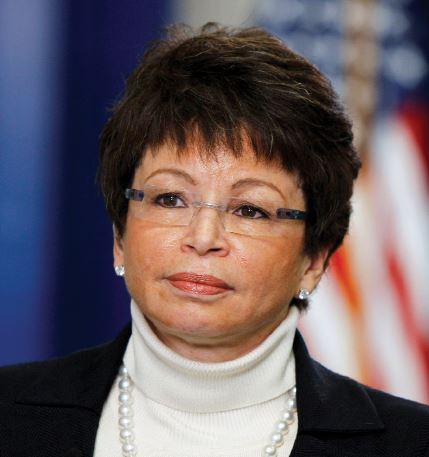Valerie Jarrett: The Power of Whispers
 One of only three senior advisers to US President Barack Obama, Valerie Jarrett holds more power than anyone else in the world, with the possible exception of her employer. That latter assertion is, however, questionable. It was Valerie Jarrett who in 1991, while deputy chief of staff to Chicago Mayor Richard Daley, hired Michelle Robinson, then employed at a private law firm and engaged to Barack Obama, to work at City Hall.
One of only three senior advisers to US President Barack Obama, Valerie Jarrett holds more power than anyone else in the world, with the possible exception of her employer. That latter assertion is, however, questionable. It was Valerie Jarrett who in 1991, while deputy chief of staff to Chicago Mayor Richard Daley, hired Michelle Robinson, then employed at a private law firm and engaged to Barack Obama, to work at City Hall.
Before accepting the job, Michelle Robinson arranged for Ms Jarrett to meet her fiancé for what would turn out to be a dinner that changed the course of contemporary history. Michelle Robinson accepted the job and a little later got married. For her part, Valerie Jarrett soon became a mentor to the Obamas and introduced the couple to the powers that be in Chicago – the same ones that would eventually propel Barack Obama’s political career to heights then still unsuspected.
As the newly-elected president prepared to move into the White House in 2009, Ms Jarrett was one of the first to knock on the door as the co-chair of the transition team charged with getting the incoming administration up and running. Since then, she officially holds the position of Assistant to the President for Intergovernmental Relations and Public Liaison. If anything, the cumbersome length of the job title is meant to hide the fact that Ms Jarrett has a say on nearly any topic likely to be discussed in the Oval Office and the adjacent corridors of power.
Currently, Ms Jarrett heads the White House offices of Public Engagement, Urban Affairs, Sports, and Intergovernmental Affairs. She also chairs the Council on Women and Girls and the Task Force to Protect Students from Sexual Assault. In fact, there is little that Ms Jarrett doesn’t control. In the polarised world of Washington politics, that much power begets plenty animosity.
Recently, Ms Jarrett was widely criticised for using her Secret Service security detail as a personal valet service having agents run errands outside the official agenda. Republican Senator Pat Roberts from Kansas, no great friend of the Obama Administration, in October told talk radio host Hugh Hewitt that he is convinced of Ms Jarrett’s involvement in the politically-motivated targeting of conservative groups by the Internal Revenue Service (IRS). Senator Roberts said that an investigation into this affair by the Senate Finance Committee was called off at the behest of the White House.
Conservative groups revel in describing Ms Jarrett as President Obama’s Rasputin for the sway she holds over the first family. They point to her outsized staff of 36 as proof that Ms Jarrett is running the Obama Administration, if not by stealth than by omnipresence. Her guidance is said to be responsible for an untold number of failures such as the US policy for the Middle East and the overreach of the intelligence community.
As the Obama Administration seems increasingly stuck and confined to responding rather than setting the agenda, it is perhaps unsurprising that Ms Jarrett receives part of the blame. Former Obama speechwriter Chris Matthews recently lambasted the president for being “intellectually lazy” and “listening to the same voices all the time.” Even Jonathan Alter of Bloomberg News, author of a hurray-book on Obama, now wonders if the president has become “atrophied into a little world peopled only by Valerie Jarrett and his wife Michelle.”
In both the pro- and anti-Obama camps, there is little doubt that Ms Jarrett is the power behind the throne in the White House. There is a growing consensus that her prominence may not be all that beneficial to either President Obama or the nation. So far, however, there are no signs that Ms Jarrett’s influence over events at the White House is diminishing. As it befits a true éminence grise, the lady seems stoically unimpressed and unfazed by the criticism levelled against her.
You may have an interest in also reading…
Otaviano Canuto, Center for Macroeconomics and Development: How to Heal the Brazilian Economy
If I were to encapsulate the current situation of the Brazilian economy in one sentence, I would say: “It is
IFC: Banking On Women – Changing the Face of the Global Economy
Women entrepreneurs are changing the face of the global economy, helping to sustain job creation and economic growth. While investors
Dr Ramphele: Opposing the ANC
This year, Mamplela Ramphele, aged 65, formed Agang (Build) a political party to oppose the African National Congress (ANC). She


















































































